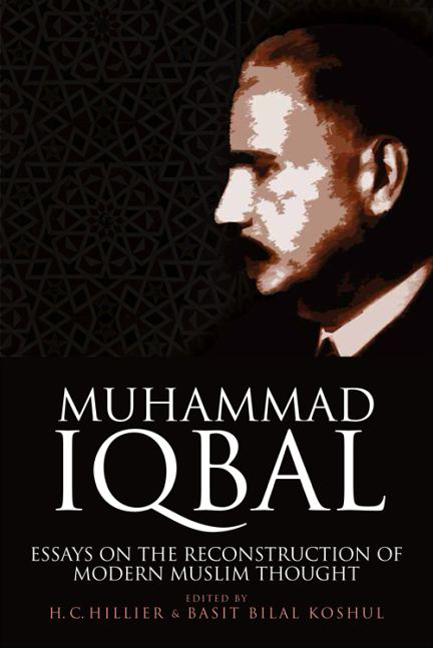Book contents
- Frontmatter
- Contents
- Preface
- 1 Introduction
- 2 The Human Person in Iqbal's Thought
- 3 Achieving Humanity: Convergence between Henri Bergson and Muhammad Iqbal
- 4 The Contemporary Relevance of Muhammad Iqbal
- 5 Pragmatism and Islam in Peirce and Iqbal: The Metaphysics of Emergent Mind
- 6 Between Hegel and Rumi: Iqbal's Contrapuntal Encounters with the Islamic Philosophical Traditions
- 7 Reconstructing Islam in a Post-metaphysical Age: Muhammad Iqbal's Interpretation of Immortality
- 8 Iqbal, Bergson and the Reconstruction of the Divine Nexus in Political Thought
- 9 Muhammad Iqbal: Restoring Muslim Dignity through Poetry, Philosophy and Religious Political Action
- Index
1 - Introduction
Published online by Cambridge University Press: 10 October 2017
- Frontmatter
- Contents
- Preface
- 1 Introduction
- 2 The Human Person in Iqbal's Thought
- 3 Achieving Humanity: Convergence between Henri Bergson and Muhammad Iqbal
- 4 The Contemporary Relevance of Muhammad Iqbal
- 5 Pragmatism and Islam in Peirce and Iqbal: The Metaphysics of Emergent Mind
- 6 Between Hegel and Rumi: Iqbal's Contrapuntal Encounters with the Islamic Philosophical Traditions
- 7 Reconstructing Islam in a Post-metaphysical Age: Muhammad Iqbal's Interpretation of Immortality
- 8 Iqbal, Bergson and the Reconstruction of the Divine Nexus in Political Thought
- 9 Muhammad Iqbal: Restoring Muslim Dignity through Poetry, Philosophy and Religious Political Action
- Index
Summary
Iqbal – poet, philosopher, educator, lawyer, political activist, social reformer – is unmatched in his versatility and breadth of knowledge and vision. He was the last and greatest thinker of the historic ‘Aligarh Movement’ that brought about a paradigm shift in the consciousness of Indian Muslims and transformed their destiny. However, Iqbal's place in history is not limited to his role as a modernist, reformist Muslim thinker in India. In my judgement, he is the most outstanding poet-philosopher of the world of Islam, and probably of the world in general, since the death of his murshid (spiritual guide) Maulana Jalaluddin Rumi (b. 1207) in 1273.
Iqbal is exceptional in many ways. He was a poet and thinker of extraordinary stature. The fact that he was able to combine poetry and philosophy as well as he did is a phenomenal accomplishment. By its very nature, poetry, working through symbols, avoids statement and prefers suggestion, whereas philosophy, dealing with logical categories and concepts, demands preciseness in thought and expression. Therefore, in a sense, a poet-philosopher is a paradox.
However, this paradox finds its basis in human nature itself. There is, in human beings, a straining both towards, and away from, definition of thought and feeling. This psychological phenomenon has found different expressions in the history of literature and philosophy. Sometimes it has led to poetry becoming philosophical or to philosophy becoming poetical, and sometimes to a complete bifurcation between poetry and philosophy (the quarrel between the poet and the philosopher being an ancient one). The joining of poetry and philosophy in an integrated whole – as in the case of Rumi and Iqbal – is a rare accomplishment.
There is one way in which Iqbal is not just extraordinary, but unique. No poet or philosopher in the history of the world has inspired and energised millions of people as he did. What he did constituted historic action, for, as Alfred Lord Tennyson proclaimed, ‘A song that nerves a nation's heart is in itself a deed’ (2014). From a young age, he became the voice of the Indian Muslims who felt like ‘a caged bird’ (Iqbal 2008), having lost their political position, economic opportunity, and cultural autonomy to the British colonisers. Iqbal understood their feelings and represented them poignantly.
- Type
- Chapter
- Information
- Muhammad IqbalEssays on the Reconstruction of Modern Muslim Thought, pp. 1 - 11Publisher: Edinburgh University PressPrint publication year: 2015



